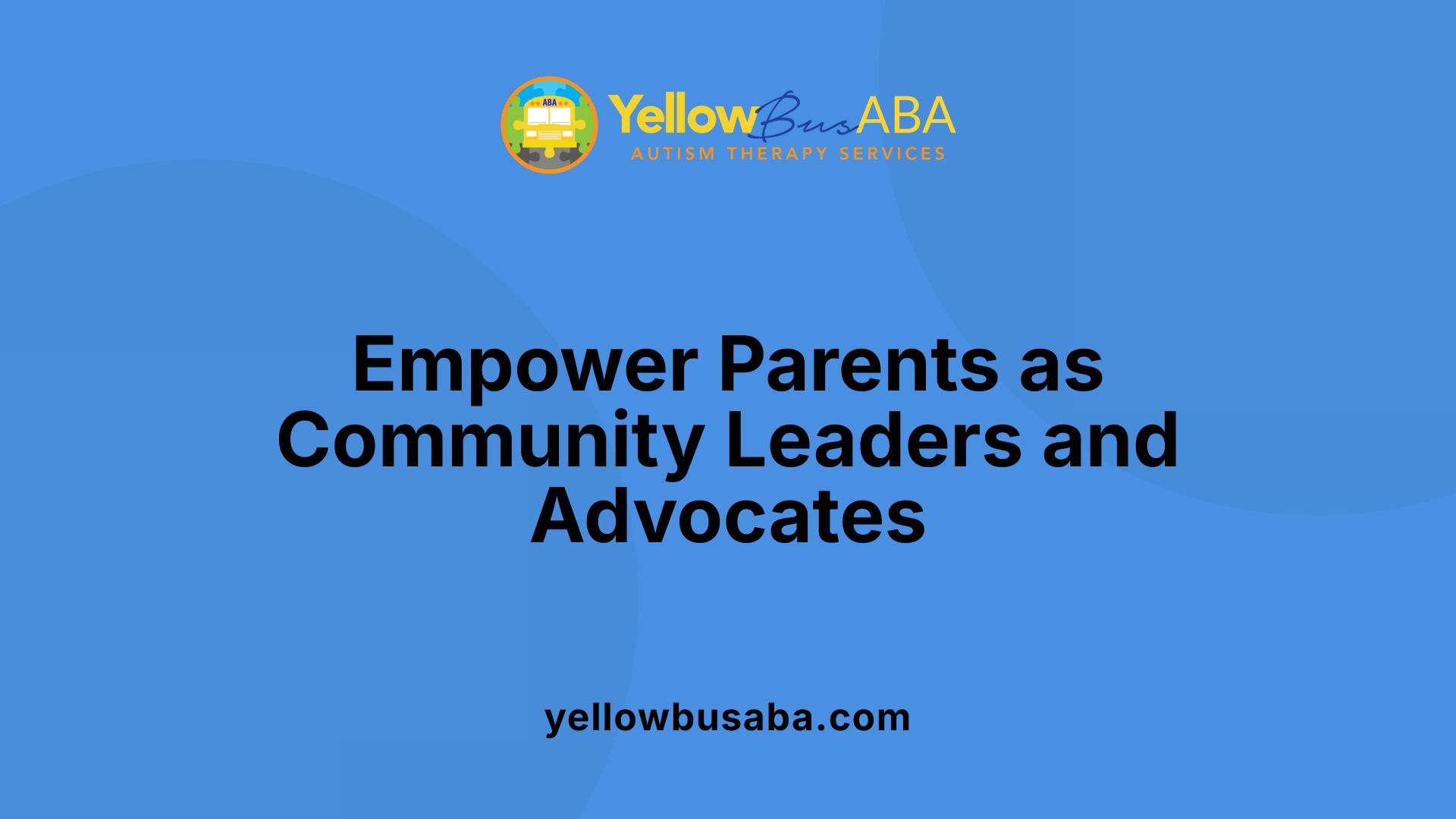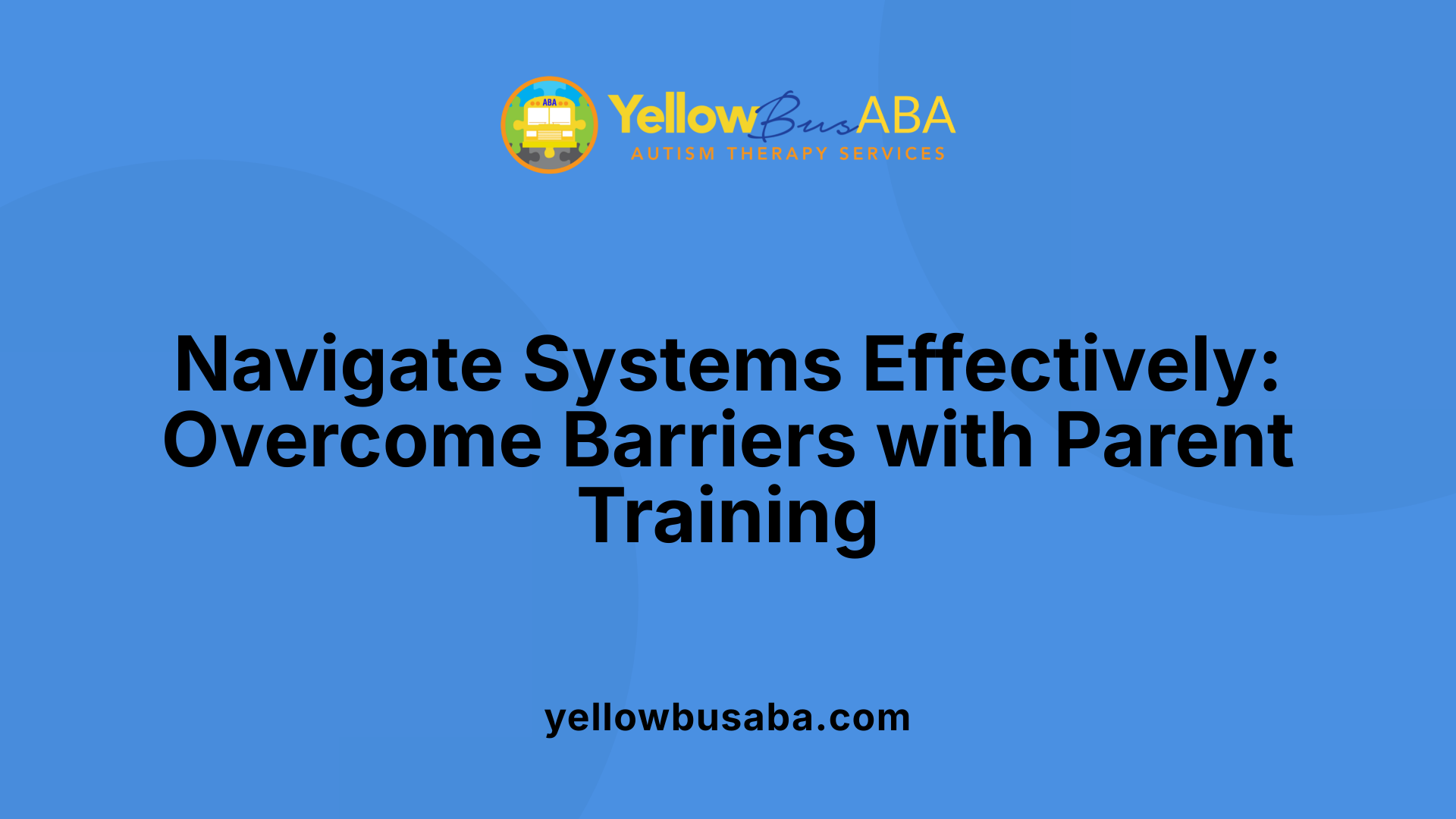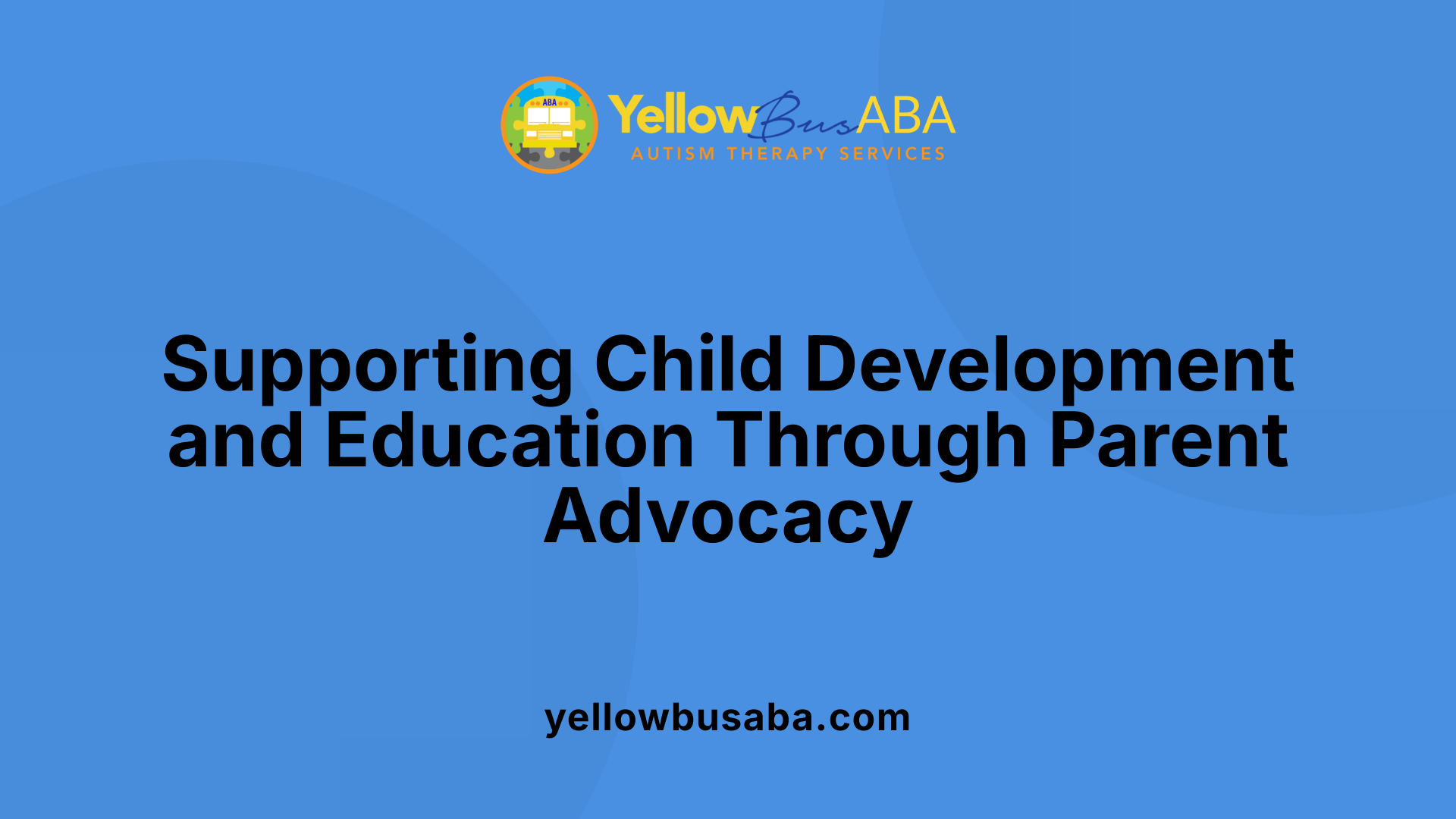Building Strong Advocates for Children's Needs
Parent training programs serve as pivotal platforms that transform parents from caregivers into confident advocates for their children. By equipping them with essential skills, resources, and leadership opportunities, these programs enable families to navigate complex systems, influence policies, and support their children's development effectively. This article explores how parent training fosters advocacy, enhances community involvement, and benefits children, particularly those with ASD or mental health needs.
Development of Leadership and Community Engagement Skills Through Parent Training

How does parent training support the development of leadership and community involvement skills?
Parent training plays a crucial role in nurturing leadership abilities and encouraging active participation in community life. It provides parents with practical tools and knowledge that empower them to organize their efforts, set priorities, and develop actionable plans that can improve their children's well-being and the larger community.
Structured programs such as Parent Leadership Tennessee and Parent Leadership Institutes are designed to boost confidence and advocacy skills among parents. These initiatives often include peer-led sessions, which foster a sense of shared purpose and collective strength.
Through training, parents learn to use models like 'Self, Family, & Team,' which help them understand their roles and develop strategies for effective advocacy. These programs also emphasize community engagement by guiding parents to participate in decision-making processes, influence policy development, and take leadership roles in local organizations.
Such involvement not only benefits their own children but also advances systemic reforms that affect education, health, and safety services. Parents become catalysts for change, collaborating with professionals and community members to promote policies that support family and child development.
Ultimately, parent training transforms ordinary caregivers into community leaders. They gain the skills to advocate confidently, organize initiatives, and build partnerships, all aimed at strengthening families and improving services for all children.
Strategies and Resources to Support Advocacy Efforts

What strategies and resources are provided through parent training to support advocacy efforts?
Parent training plays a crucial role in equipping families with essential skills and tools to effectively advocate for children with developmental needs, including those with ASD. Training programs offer diverse strategies that empower parents to navigate complex systems and participate actively in decision-making.
One vital component is teaching communication techniques. Parents learn how to organize their thoughts, articulate concerns clearly, and engage professionally during meetings or in written correspondence. This helps ensure their child's needs are understood and addressed.
Understanding legal rights and entitlements is another cornerstone. Parents become familiar with laws like the Individuals with Disabilities Education Act (IDEA), which grants rights to special education services, and learn how to invoke these rights confidently.
Developing personalized advocacy plans is encouraged, guiding parents through goal setting, identifying key participants such as educators and healthcare providers, and outlining steps to access services. These plans are often supported by available resources like sample letters, forms, newsletters, and tip sheets.
Numerous informational resources supplement training efforts. These include webinars, videos, and digital toolkits created by organizations like the PACER Center. These tools enhance understanding and provide practical guidance on advocating within educational, health, and community systems.
Specific programs like 'Parents for Change' and initiatives such as Head Start emphasize skills in systems-level advocacy, including how to influence policy, work with decision-makers, and participate in community activities. Workshops and curricula focus on leadership development and community organizing.
Overall, parent training offers comprehensive support, boosting confidence and competence. By gaining access to targeted strategies and resources, parents are better equipped to champion their children's needs and effect positive change at home, school, and within wider society.
Enhancement of Advocacy Skills Via Parent Training Programs

How does parent training improve advocacy abilities in parents?
Parent training programs are vital in equipping families with the skills needed to effectively advocate for their children. These programs focus on several areas, including navigating complex systems and understanding legal and educational rights.
One major aspect of parent training is teaching parents how to understand and manage the various systems their children interact with, such as healthcare, education, and community services. For example, programs like the Parent, Family, and Community Engagement (PFCE) Framework, Head Start, and the Parent Leadership Training Institute provide parents with tools to participate actively in decision-making processes, policy development, and organizational reforms.
Additionally, these trainings foster communication skills that are essential in storytelling, sharing their child's experiences, and collaborating with educators, healthcare providers, and policymakers. Techniques such as clear, effective communication and storytelling help parents articulate their child's needs compellingly and advocate more successfully.
Confidence building is also a significant component. Many programs offer webinars, tip sheets, and curricula designed to empower parents, helping them feel more confident in their advocacy roles. For instance, the Parent Empowerment Program (PEP) training enhances parents’ perceived skills and confidence, translating into more proactive engagement.
Moreover, parent training emphasizes understanding rights—like those outlined in laws such as the Individuals with Disabilities Education Act (IDEA)—and how to leverage these rights in advocating for tailored services and accommodations.
Overall, parent training transforms families from passive recipients of services into active, confident advocates capable of influencing their child's educational, health, and community environments.
Impact of Parent Training on Navigating Services and Overcoming Barriers

How does parent training impact a parent's ability to navigate services and overcome barriers for their child?
Parent training plays a vital role in strengthening a parent's capacity to effectively access and utilize services for their children. Through structured programs, parents learn to understand complex service systems, including health, education, and community resources. These programs boost their knowledge of available services, process procedures, and the roles of various providers.
Evidence-based initiatives like Family Navigation and SPANS demonstrate that tailored training enhances parental confidence and advocacy skills. Parents become more capable of engaging with providers, asking the right questions, and ensuring their child's needs are addressed promptly. This increased competence often results in earlier diagnosis and intervention, which are critical for children with developmental and mental health challenges.
Addressing barriers faced by underserved families is another critical benefit of parent training. Training programs are designed to consider cultural, linguistic, and systemic obstacles. For example, involving community stakeholders or providing bilingual resources helps make information more accessible to minority and low-resource families.
Furthermore, parent training improves communication with care providers, fostering collaborative relationships that are essential for effective advocacy. Families learn to voice their concerns confidently and navigate social determinants such as housing insecurity, transportation issues, or immigration-related fears.
In sum, comprehensive parent training equips families with the skills and confidence needed to overcome systemic and interpersonal barriers. This empowerment leads to better service access, more effective advocacy, and ultimately, improved outcomes for children.
Benefits of Parent Training for Children with ASD and Mental Health Needs
What benefits does parent training provide for children with ASD or mental health needs?
Parent training offers a wide range of advantages for children with autism spectrum disorder (ASD) or mental health challenges. Primarily, it increases parental understanding of their child's condition, enabling them to advocate more effectively for services and supports.
Active involvement of parents in targeted interventions has been shown to promote crucial developmental skills. For example, caregiver-led strategies help improve social communication, joint attention, and behavior management. These improvements often lead to reductions in problematic behaviors and help address core ASD symptoms.
Training programs are adaptable to meet individual family needs and can be delivered through multiple formats, such as in-person sessions, telehealth, or online modules. This flexibility makes parent training more accessible and increases the likelihood that parents will implement learned strategies consistently.
Beyond developmental benefits, parent training positively impacts parental mental health. Many parents experience decreased stress and increased confidence in managing their child's needs. Enhanced family resilience is a common outcome, contributing to a more supportive and stable home environment.
Overall, parent training not only supports children’s growth and development but also empowers families, helping them navigate ongoing challenges and fostering a more resilient family unit.
The Critical Role of Parent Training in Promoting Child Development and Educational Success

Why is parent training important in promoting effective advocacy for child development and education?
Parent training plays a crucial role in empowering parents to become strong advocates for their children's developmental and educational needs. It provides parents with the essential skills, knowledge, and confidence necessary to navigate complex systems such as schools and healthcare services.
Through dedicated training programs, parents learn to understand their child's rights, including legal frameworks like IDEA for special education, and develop effective communication strategies. These skills enable them to work collaboratively with educators, therapists, and health professionals.
Active involvement fostered by advocacy training encourages parents to participate more fully in decision-making processes, policy development, and community activities. Their leadership can influence school practices, shape community programs, and help reduce barriers such as bureaucracy and stigma.
Research supports that parent training improves the child's progress by enhancing behavioral skills, communication, and social interactions, especially in children with ASD and developmental challenges. It also reduces parental stress by increasing confidence and understanding.
Ultimately, well-trained parents serve as powerful advocates and community leaders. They can instigate positive change in educational environments, promote inclusive policies, and support their children's overall well-being.
How do advocacy efforts shape educational and community systems?
Parent advocacy leads to meaningful improvements in policies and practices. By organizing and participating in decision-making, advocacy training helps parents influence school curricula, safety protocols, and inclusion initiatives.
Partnerships between parents and educational institutions foster more responsive and supportive learning environments. These collaborations ensure that children with special needs receive appropriate resources and accommodations.
Communities benefit when parent leaders share their skills in organizing events, mentoring other parents, and promoting awareness. This collective effort enhances service accessibility and reduces disparities.
| Key Aspects of Parent Advocacy | Impact on Child and Community | Supporting Strategies |
|---|---|---|
| Leadership & organizing | Improved school policies & community awareness | Parent training programs, webinars, & resources |
| Knowledge of rights & systems | Better access to services & support | Building communication & negotiation skills |
| Decision-making involvement | Customized support and tailored education | Active participation in school activities & policy discussions |
Fostering Leadership, Confidence, and Change
Parent training programs are essential avenues for empowering families to become effective advocates, community leaders, and catalysts for systemic change. By developing skills in advocacy, leadership, and navigation, parents can better support their children’s individual needs and influence positive outcomes in education, health, and community systems. The culmination of these efforts not only benefits children with ASD or mental health challenges but also strengthens families and communities, fostering a culture of proactive leadership and inclusive support.
References
- Parents' Experiences in Advocating for Children and Youth ...
- Skills for Effective Parent Advocacy
- Enhance Parents' Advocacy and Leadership Skills
- 8 Reasons to Complete ABA Parent Training
- Make an Impact as Your Child's Advocate
- Impact of Empowerment Training on the Professional Work ...
- Enhance Parents' Advocacy and Leadership Skills
- MO Lay Educational Advocacy Program
- Skills for Effective Parent Advocacy






